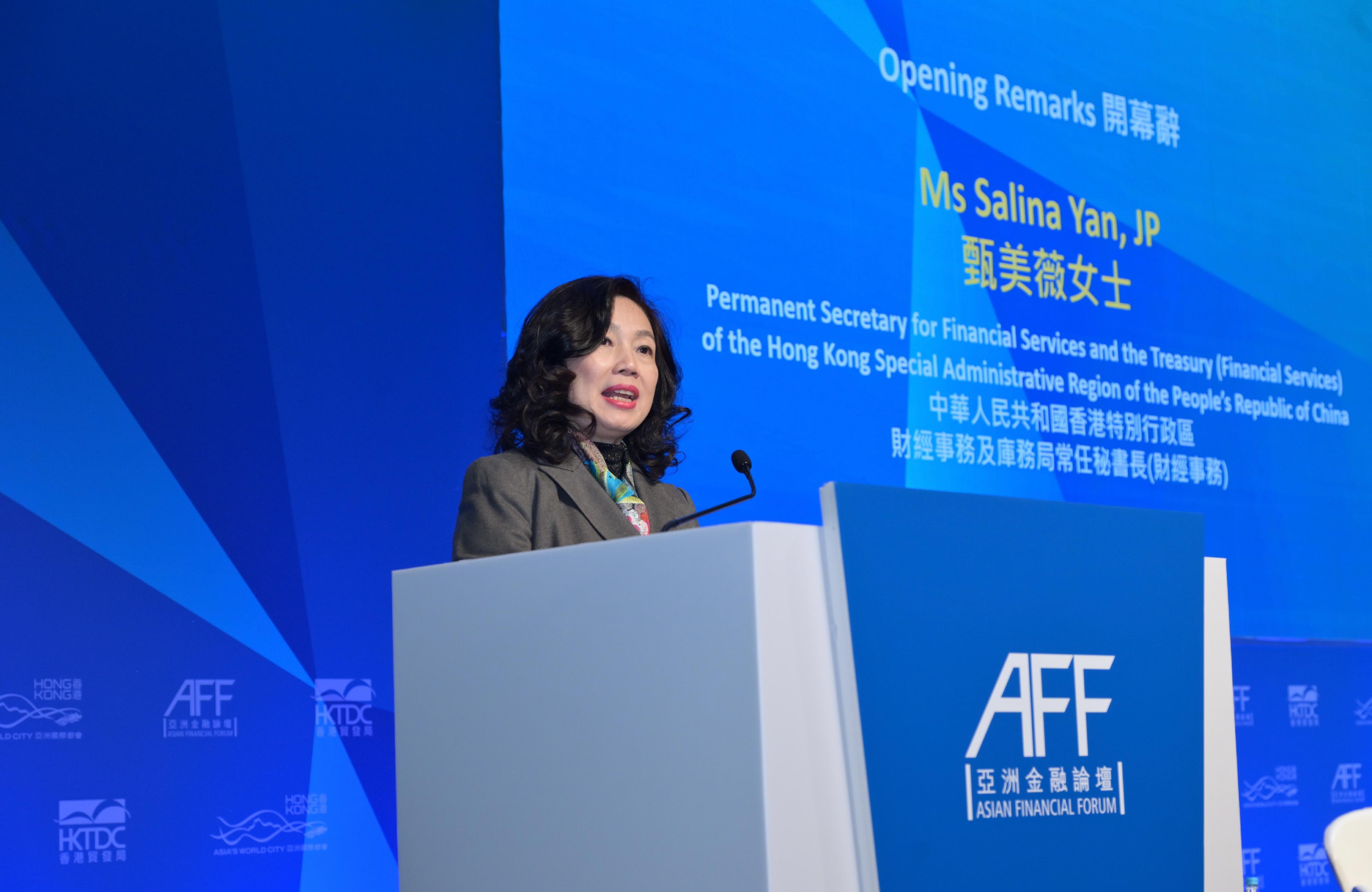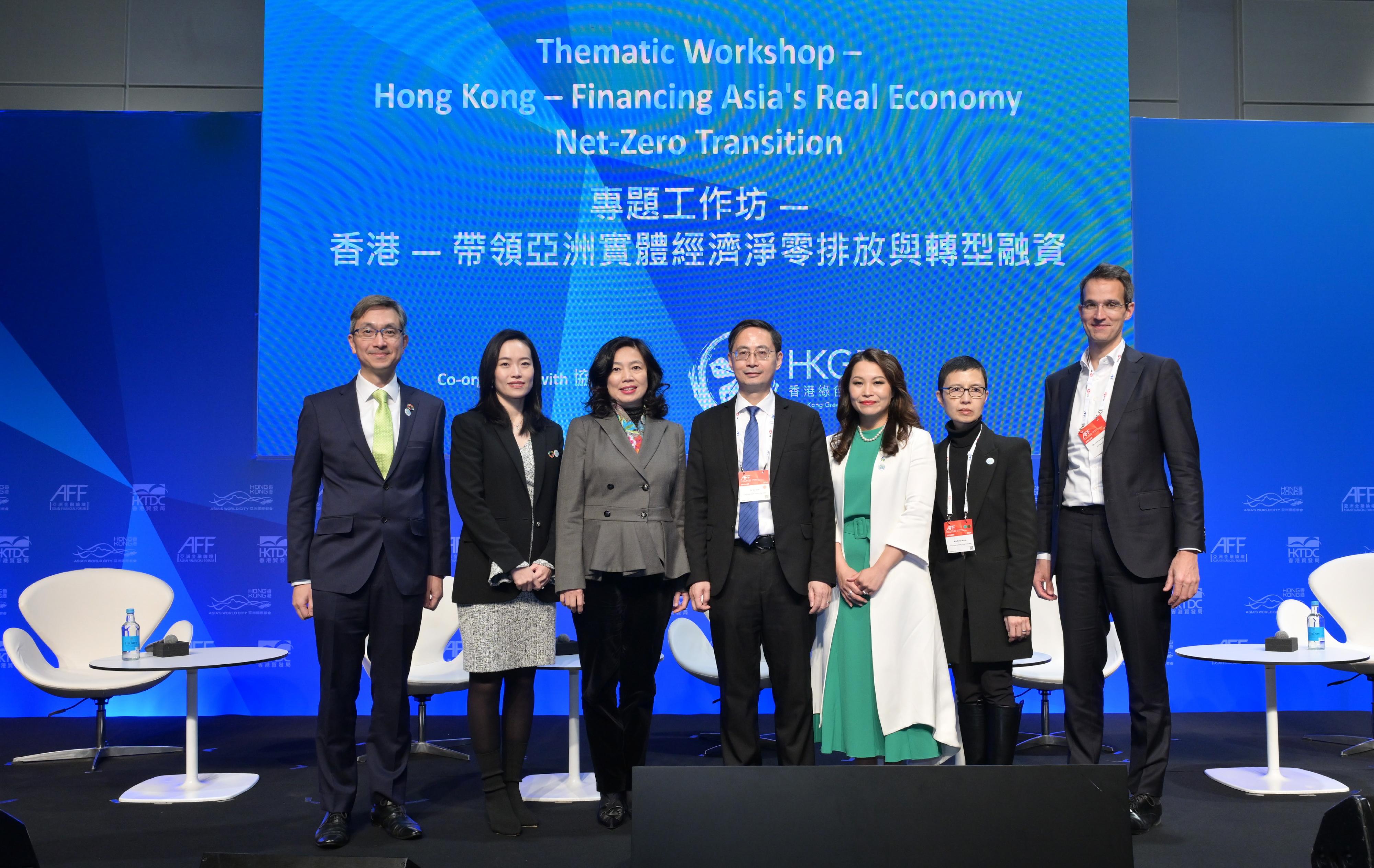Opening remarks by Permanent Secretary for Financial Services and the Treasury (Financial Services) at Asian Financial Forum Thematic Workshop on Hong Kong - Financing Asia's Real Economy Net-Zero Transition (English only) (with photos)
******************************************************************************************
Dr Ma (Chairman and President of the Hong Kong Green Finance Association, Dr Ma Jun), distinguished guests, ladies and gentlemen,
Good afternoon. This Thematic Workshop on Financing Asia's Real Economy Net-Zero Transition has been an integral part of the Asian Financial Forum (AFF) since 2020. I thank the Hong Kong Green Finance Association for its foresight in initiating this important dialogue leveraging the magnetic AFF platform.
The ability to foresee future challenges and probable eventualities faced by human societal development and our natural world is indeed the force driving the global collective search for climate change and sustainability solutions. This has been a rather long journey. Following intensive discussions in COP 28 (the 28th Conference of the Parties to the United Nations Framework Convention on Climate Change) held in Dubai last December, we have been presented with an interim report card of how the world has been doing, or not doing enough, in managing climate change.
If you don't have the time yet to go through the 20-page long document, let me take just a minute to share a few points in the Global Stocktake Outcome Statement that came out on December 13 in Dubai. I would like to do so here not least because I, like Dr Ma, have the privilege of being there on the ground in Dubai when COP 28 took place but it would also serve to provide some contextual relevance to our discussions today.
Notably, the Statement reaffirms the goal of pursuing efforts to limit temperature increase to 1.5 degree Celsius above pre-industrial levels, recognising that this would significantly reduce the risks and impacts of climate change. It indicates serious concern that emissions of greenhouse gases have unequivocally caused global warming and that responses are observed to be fragmented and incremental. It notes that both adaptation and mitigation financing would need to increase manyfold and that there is sufficient global capital to close the global investment gap but there are barriers to redirecting capital to climate change. It underlines the fundamental role of technology development and innovation facilitating urgent adaptation and mitigation actions. Lastly, it reaffirms commitment to multilateralisation and international co-operation to achieve the common purpose and goals.
This very last point echoes well this year's AFF theme Multilateral Cooperation for a Shared Tomorrow. The fight against climate change requires collective international actions and collaboration of both public and private sectors.
Hong Kong has set itself the target to achieve carbon neutrality before 2050 and reduce Hong Kong's carbon emission by 50 per cent before 2035. We are in agreement with the call to direct capital towards climate-resilient projects and green transition development through different channels and means to achieve local and global goals. Hong Kong's role as an international financial centre places us in a very unique position to contribute to the mission. According to the Asia Securities Industry and Financial Markets Association, in the next 30 years, the Asian region will require US$66 trillion in climate investment. Hong Kong's financial services with global influence can be part of the solutions by mobilising marketing capital to fulfil the funding need.
We are making good progress in enabling green financing by taking concrete actions. Let me cite some examples to illustrate. First, on enriching the financing channels, since 2019, Hong Kong has issued around US$24 billion of green bonds under the Government Green Bond Programme denominated in multiple currencies including notably Renminbi, and of various tenors from the shortest one year to the longest 30 years. Of these, some HK$20 billion belong to our inaugural retail green bond issuance, the largest across the globe at the time. Taken together, the volume of green and sustainable bonds arranged in Hong Kong accounted for one-third of the Asian green and sustainable bond market. There are above 200 ESG (environmental, social and governance) funds authorised by the Securities and Futures Commission (SFC), with a total AUM (assets under management) of above US$160 billion. I think the trend is that they are going to grow even further this year.
As you know, the Hong Kong Exchanges and Clearing Limited (HKEX) launched an international carbon marketplace, Core Climate, in October 2022, which is currently the only carbon marketplace that offers HKD and Renminbi settlement for the trading of international voluntary carbon credits. Taking a forward looking approach, the HKEX has recently signed a Memorandum of Understanding with the China Emissions Exchange Shenzhen to jointly explore opportunities in cross-boundary carbon market connectivity and climate finance, especially the Guangdong-Hong Kong-Macao Greater Bay Area. In fact, with our country's strong commitment to net-zero and the recent development in voluntary carbon trading, we see a lot of potential for Hong Kong to be the competent middleman in this space.
Second, we work to provide a conducive environment for technology adoption. A good example is our pilot issuance of the world's first government tokenised green bond in February last year. This applied the Distributed Ledger Technology (DLT) to primary issuance, settlement of secondary trading, coupon payment as well as maturity redemption. This issuance has demonstrated the feasibility of deploying DLT to real capital market transactions under our existing legal and technological framework, with enhanced efficiency and reduced cost. With this very successful first attempt, we are now in discussion with market participants on expanding the DLT use cases, including a second tokenised government green bond issuance.
We have also set up a high-level Green Technology and Finance Development Committee, chaired by the Financial Secretary, to foster the development of a vibrant green ecosystem in Hong Kong. Areas being looked at include development of green certification and alignment with international standards, promotion of commercialisation of R&D (research and development) outcomes, green finance application and innovation and talent development, etc.
Thirdly, we attach importance to capacity building and support to the industry. We are providing funding support to green bond issuers and loan borrowers under our well received Green and Sustainable Finance Grant Scheme. As of mid-January this year, we have granted some HK$210 million to some 340 green and sustainable debt instruments issued in Hong Kong, involving a total underlying debt issuance of around US$100 billion.
We also launched in December 2022 a three-year Pilot Green and Sustainable Finance Capacity Building Support Scheme for application by market practitioners and related professionals as well as students and graduates of relevant disciplines. After completing eligible programmes or accomplishing relevant qualifications, applicants can apply for a subsidy of up to HK$10,000. As of early January 2024, there were 47 eligible programmes and qualifications as provided by the professional and continuing education schools of local universities, professional institutions, international training providers, etc, and the list will continue to be updated and expanded. Around 570 reimbursement applications have been approved so far, involving a total reimbursement amount of some HK$3.6 million. We will certainly continue to review the operation of these schemes in light of the experience gained and feedback collected from the industry and the participants.
Now I have given you some idea of what we have done so far. Let me take a step forward and look at the priorities that we are going to embark on this year. Building on the above solid foundation, we are set to strengthen our ecosystem as a green finance hub in the region and beyond. We have set ourselves three priorities for this year.
First, on sustainability disclosures, we recognise investors' interest in obtaining more information to understand how climate change affects the business operations, assets and financial conditions of their investments. Our Stock Exchange was one of the first exchanges to mandate ESG disclosures, and will enhance climate-related disclosures under its Listing Rules from the start of 2025 taking into account the Sustainability Disclosure Standards published by the International Sustainability Standards Board (ISSB).
The Government has made a top-level announcement in the Chief Executive's 2023 Policy Address that a roadmap will be developed on the appropriate adoption of the ISSB Standards. The Financial Services and the Treasury Bureau and the SFC are preparing this roadmap, which will comprise four key pillars, namely sustainability reporting, assurance, data and technology, and capacity building. A working group has been set up and will soon start the engagement with stakeholders to identify the specific circumstances that should be considered when implementing the ISSB Standards in Hong Kong.
The second area of our priorities is on green fintech. Efficiency and efficacy of sustainability reporting can be enhanced with the use of technology. We are developing new greenhouse gas emissions calculation and estimation tools with professional assistance from our renowned universities. These free and publicly accessible tools will be useful as alternative sources of information for climate risk management and related analysis and research, particularly to small and medium enterprises which need better support in the net-zero journey.
We are also working to combine our advantages in fintech with green finance, aiming at building Hong Kong as a green fintech hub. The figures are encouraging, as there are currently around 1 000 fintech companies in Hong Kong with many specialising in the arena of green fintech, which provide technological solutions on ESG data analytics, ESG reporting preparation, and related subjects. To practically support these budding companies and drawing on the successful experience in the implementation of the Fintech Proof-of-Concept Subsidy Scheme over the past two years, we will launch a proof-of-concept subsidy scheme for green fintech companies in the first half of this year, with the objective of providing early-stage funding for pre-commercialised green fintech companies, hence expanding the green fintech ecosystem in Hong Kong.
Third, on transition finance, we are going to make strides in incorporating transition finance facilitation into our various initiatives. Although Hong Kong has a rather light carbon footprint because we are not a big player in carbon intensive industries, we could leverage on our role as an international financial centre to support the transition of the region to net-zero. A well-defined taxonomy that incorporates transition definitions can assist our investors to identify and invest in such activities by offering much-needed clarity and guidance. We are in the process of putting in place a local green classification framework for use across financial sectors, so as to facilitate easy navigation among mainstream taxonomies. Building on the views collected during the consultation, the Hong Kong Monetary Authority will publish the Hong Kong Taxonomy for Sustainable Finance probably in the first quarter of this year. Looking forward, we will broaden the development of our local taxonomy to encompass transition activities. This will allow us to effectively collaborate with regional and international partners, with a view to reducing potential fragmentation challenges across markets and having the set of common standards for us all.
Ladies and gentlemen, looking ahead, with our country's strong commitment to net-zero and the recent development in transition finance and voluntary carbon trading, we see a lot of room for Hong Kong to play an active role in this area. My sincere appreciation again to the Hong Kong Green Finance Association for its engagement and dedication to this important task. I look forward to the very fruitful discussion by the panelists and wish you all a rewarding event and the best of business and health. Thank you.
Ends/Thursday, January 25, 2024
Issued at HKT 19:15
Issued at HKT 19:15
NNNN




